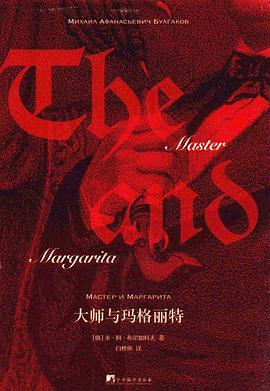WULOLIFE
《大师与玛格丽特》作者: [俄]米·阿·布尔加科夫出版社: 中央编译出版社
《大师与玛格丽特》作者: [俄]米·阿·布尔加科夫出版社: 中央编译出版社
Couldn't load pickup availability
Description
内容简介 · · · · · ·
《大师与玛格丽特》为俄罗斯作家布尔加科夫最重要的作品,被公认为20世纪最伟大法国的《理想藏书》对它推崇备至,诺贝尔文学奖得主马尔克斯(魔幻现实主义文学代表人物,《百年孤独》的作者)称它“精妙绝伦”。作家曾八易其稿,将现实与魔幻融为一体,揭示了人性、爱情、公正、善恶有报等主题。
长篇小说《大师与玛格丽特》中有三条主线:魔鬼撒旦造访莫斯科,做了为期两天的逗留,并施展法术大闹了莫斯科;大师与玛格丽特的爱情故事,历经劫难的情侣以特殊的方式终成眷属下令杀害基督耶稣的罗马总督本丢•彼拉多两千年的忏悔。这三条线索彼此穿插交替,通过巧妙的架构和时空的切换,为读者呈现了社会阴暗、丑恶和不合理的本质,同时也讴歌了勇于追求自由和幸福的人性。这部小说此前已有多个中文译本,国内的读者也通常以这三条主线为基础,将小说的中心思想理解为撒旦的惩恶扬善、玛格丽特对爱情的忠贞和罗马总督对怯懦人性的反省。本书译者结合近年来俄罗斯学者的最新研究成果,重新翻译了这部经典名著。
编辑推荐
1.本书作为一部俄罗斯经典文学作品,被誉为20世纪非常伟大的小说之一,展示了一个复杂的道不仅具有文学价值,而且对于反观一个具有压制性的现实社会,具有深刻的价值。
2.文本具有极为瑰丽的想象,故事结构和叙述有着极其独特的魅力,能够让首次阅读它的读者爱上这个作品和它的作者,吸引一批文学爱好者。
3.此前虽有几个译本,但本书译者结合近年来俄罗斯学者的全新研究成果,重新翻译了这部经典名著,并在此基础上增加了35000余字的译注,尝试对这部“旷世奇书”进行全方位的解读。
不同的是卡夫卡对现实的仇恨来源于自己的内心,而布尔加科夫则有切肤之痛,并且伤痕累累。因此,当他开始发出一生中zui后的声音时,《大师与玛格丽特》就成为道路,把他带到了现实面前,让他的遗嘱得到了发言的机会。
——中国作家余华布尔加科夫的创作达到了讽刺文学、幻想文学和严谨的现实主义小说的主峰,并且还在很大程度上代表和影响了当代的文学倾向——即对文学综合发展的愿望。
——苏联作家西蒙诺夫一场超现实主义狂欢……天马行空,肆无忌惮。
——美国作家乔伊斯•卡罗尔•欧茨才华横溢,幽默有趣,但又深刻严肃、变幻莫测……《大师与玛格丽特》是一一个复杂的道德与政治寓言……是精彩的英狂欢。
——英国剑桥大学斯拉夫语系教授西蒙•富兰克林
作者简介 · · · · · ·
作者简介布尔加科夫(1891—1940),俄罗斯小说家、剧作家,被誉为20世纪俄罗斯非常伟大的作家。自幼喜爱文学、音乐、戏剧,深受果戈理、歌德等的影响。布尔加科夫为人所知。
布尔加科夫出生于乌克兰基教授家庭。1916 年基辅大学医疗系毕业后任乡村医生,国内战争时期曾被白卫军征召为军医。他的兄弟们也都参加了白军,除了米哈伊尔以外,都流落到巴黎。布尔加科夫从未被允许去西方探望他们。19 21 Years ago揭露并讽刺不良社会现象,以幽默和辛辣的文风著称,如短篇小说《魔障》、中篇小说《不祥的蛋》《狗心》和长篇小说《白军》等,在文坛产生很大的影响,但也引起争论。从1927年起,他的作品实际上已经被禁止发表。
